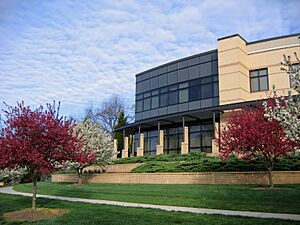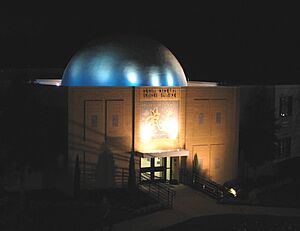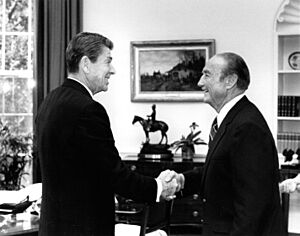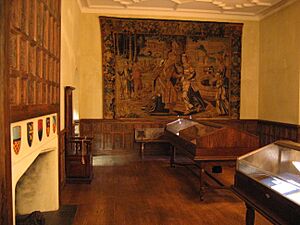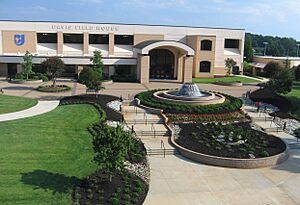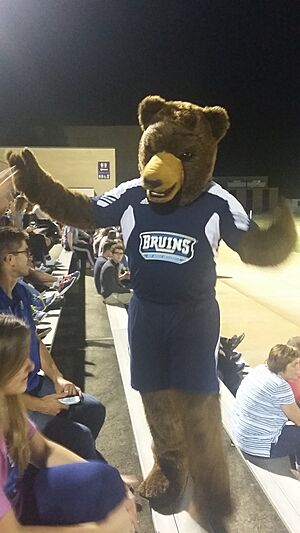Bob Jones University facts for kids
|
Former name
|
Bob Jones College (1927–1947) |
|---|---|
| Motto |
Latin: Petimus Credimus
|
|
Motto in English
|
We seek, we trust |
| Type | Private university |
| Established | 1927 |
| Accreditation | SACS, TRACS |
|
Religious affiliation
|
Evangelical Christian (formerly Christian fundamentalism) |
| Endowment | $20.5 million (2024) |
| Chancellor | Bob Jones III |
| President | Bruce McAllister |
| Provost | David Fisher |
|
Academic staff
|
287 |
| Students | 2,893 |
| Undergraduates | 2,477 |
| Postgraduates | 416 |
| Location |
,
South Carolina
,
29614-0001
,
United States
34°52′23″N 82°21′50″W / 34.873°N 82.364°W |
| Campus | Small city, 210 acres (85 ha) |
| Colors | Blue and white |
| Nickname | The Bruins |
|
Sporting affiliations
|
NCCAA Division II – South |
| Mascot | Brody the Bruin |
 |
|
Bob Jones University (BJU) is a private Christian university in Greenville, South Carolina. It is known for its conservative religious and cultural beliefs. The school has about 2,900 students.
BJU is accredited by two organizations: the Southern Association of Colleges and Schools Commission on Colleges (SACSCOC) and the Transnational Association of Christian Colleges and Schools (TRACS). By 2017, the university had more than 40,000 graduates.
Contents
History of the University
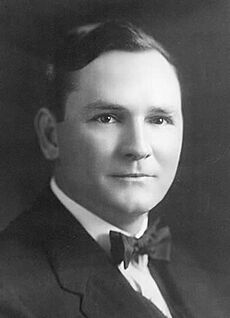
How It All Started
In the 1920s, a Christian evangelist named Bob Jones Sr. became worried. He felt that many colleges were becoming less religious. He wanted to create a school that would hold onto traditional Christian values.
On September 12, 1927, he opened Bob Jones College in Florida with 88 students. His friends convinced him to name the school after himself so people would know he was connected to it.
Moving and Growing
The college faced money problems and had to move to Cleveland, Tennessee, in 1933. But over the next 13 years, it grew to become the largest liberal arts college in the state. After World War II, many soldiers used the G.I. Bill to go to college. To make room for more students, the school moved to Greenville, South Carolina, in 1947.
When it moved, the school changed its name to Bob Jones University. The founder's son, Bob Jones Jr., became the second president. The university grew quickly in Greenville. It started a radio station, a film department, and an art gallery.
Years of Change
In the 1950s, BJU had a public disagreement with the famous evangelist Billy Graham. The argument was about whether different Christian groups should work together. This caused some problems for the school, but its enrollment soon recovered.
Bob Jones III became the third president in 1971. In 2005, his son, Stephen Jones, became the fourth president. For the first time in the school's history, a president not from the Jones family, Steve Pettit, was chosen in 2014. After Pettit and other leaders resigned, Bruce McAllister was named the seventh president in 2025.
What Students Learn at BJU
|
|
The university has seven colleges and schools. They offer over 60 majors for students to choose from.
Religious Education
The School of Religion trains students for Christian work. Men can train to become pastors. In 2017, more than 100 pastors in the Greenville area alone were BJU graduates.
Fine Arts
The Division of Fine Arts is the largest department at BJU. Each year, students put on an opera and Shakespearean plays. The school also has a radio and television station, WBJU. Students also perform in over a hundred concerts and shows every year.
Science Studies
Bob Jones University teaches Young Earth Creationism. This is the belief that God created the Earth in six days, as described in the Bible. The university's science teachers do not believe in the theory of evolution.
Accreditation
For many years, BJU chose not to be officially recognized by major educational groups. This is called academic accreditation. The founder, Bob Jones Sr., was worried that these groups might try to change the school's religious beliefs.
However, BJU graduates were still accepted into major graduate schools. In 2006, the university received accreditation from TRACS. In 2017, it also earned accreditation from SACSCOC, a major regional accrediting group.
Politics and Community
Bob Jones Sr. was interested in politics from a young age. Over the years, the university and its leaders became influential in politics, especially in South Carolina.
For a long time, the university supported politicians who shared its conservative views. In the 1960s, the school taught that racial segregation was supported by the Bible. This and other views, such as its rules against interracial dating, were very controversial.
Ties to the Republican Party
Starting in the 1960s, BJU faculty and graduates became active in the Republican Party in South Carolina. Many Republican candidates for local, state, and national offices would visit the campus to speak to students and staff.
In 1980, Ronald Reagan spoke at the school. In the 1990s, other famous Republicans like Dan Quayle and Bob Dole also visited.
The 2000 Presidential Election
In 2000, presidential candidate George W. Bush visited BJU. He was criticized for not speaking out against the school's rules and its views on Catholicism. Bush later apologized for not addressing these issues during his visit. This event brought a lot of national attention to the university.
Stepping Back from Politics
When Stephen Jones became president in 2005, he said he did not want the university to be as involved in politics. He wanted the school to focus on its main message of sharing the Christian gospel with individuals.
However, in 2015, the university once again became a stop for Republican presidential candidates. But unlike in the past, the university president did not officially endorse any candidate.
Life on the BJU Campus
The university is located on a 205-acre campus in Greenville. The buildings are made with a light yellow brick.
Museum and Art Gallery
Bob Jones Jr. loved European art and started a collection for the university. The BJU Museum & Gallery has over 400 European paintings from the 14th to the 19th centuries. It is especially known for its collection of Baroque art.
The museum also has ancient items from the Holy Land. For many years, the museum was located on campus. In 2017, it closed, and there are plans to build a new museum off-campus in the future.
Mack Library
The J.S. Mack Library holds over 300,000 books. A special room called the "Jerusalem Chamber" is a copy of the room in Westminster Abbey where the King James Version of the Bible was translated. This room displays a collection of rare and old Bibles.
Student Life at BJU
A Religious Focus
Religion is a very important part of student life. Students and teachers recite the BJU Creed at chapel services four times a week. The university also encourages students to help start new churches.
The university requires that the King James Version (KJV) of the Bible be used in chapels and classrooms.
Rules for Students
BJU has a strict code of conduct. The rules are meant to encourage students to live according to the school's Christian values. For example, students are told to avoid entertainment that is considered inappropriate.
Students must dress in a certain way for classes. Men wear dress shirts or polo shirts. As of 2018, women can wear either pants or skirts and dresses. All students must attend chapel services during the week. There are also rules about curfews and the types of movies and music students can enjoy.
Clubs and Activities
All new students who live on campus must join a "society." These are like clubs where students can make friends and participate in activities. The 33 societies compete against each other in sports, debates, and academic contests.
Every December, the university holds a large Christmas carol lighting ceremony. In 2004, BJU set a Guinness World Record for the largest group of carolers, with 7,514 people singing together.
BJU Bruins Athletics
The university's sports teams are called the Bruins. BJU is a member of the National Christian College Athletic Association (NCCAA).
Sports Teams
BJU has 11 varsity sports teams.
- Men's sports: basketball, baseball, cross-country, golf, soccer, and track & field.
- Women's sports: basketball, cross-country, soccer, track & field, and volleyball.
The university started its sports program in 2012. Since then, the Bruins have won 22 NCCAA National Championships. From 2020 to 2023, BJU was also a provisional member of NCAA Division III.
Well-Known Graduates
Many BJU graduates have become leaders in Christian organizations. Some have also gone into politics.
- Asa Hutchinson served as the governor of Arkansas.
- His brother, Tim Hutchinson, served as a U.S. Senator.
- Several other graduates have served in state governments across the country.
 | Selma Burke |
 | Pauline Powell Burns |
 | Frederick J. Brown |
 | Robert Blackburn |


